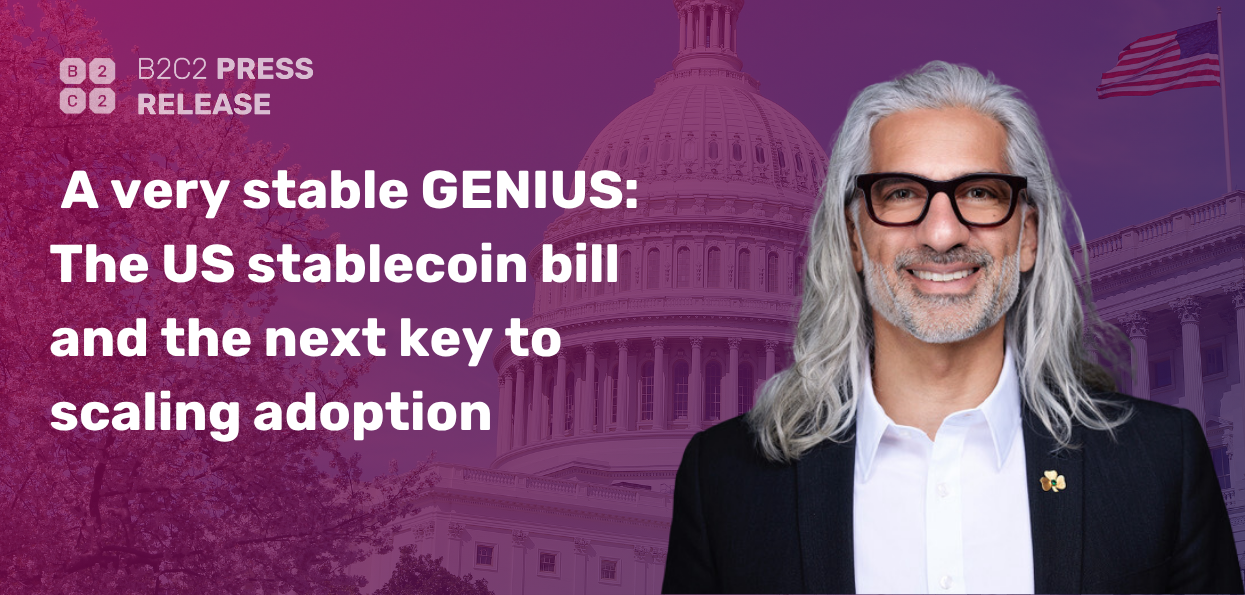
A market maker’s perspective
On Friday, 18th July, President Donald Trump signed into law the Guiding and Establishing National Innovation for U.S. Stablecoins (GENIUS) Act – a landmark piece of legislation providing guidance to stablecoin issuers operating in the United States.
The bill sets requirements for stablecoin issuers' permitted reserves and restricts issuers from paying interest on holdings. It clarifies which state and federal agencies are responsible for regulating stablecoin companies, and prohibits custodians from commingling funds. The GENIUS Act is a strong first step in bringing clarity to the U.S. digital assets industry.
This bill invites innovation – but while it lays the foundation for massive growth in digital payments, the industry still needs infrastructure to support stablecoins at scale. Converting between stablecoins and off-ramping into fiat currency remains costly and constrained by exchange-traded models. With the introduction of instant, costless conversion, stablecoin-based payments will create significant value for companies across the real economy.
The Stablecoin Value Proposition
Stablecoin trading volumes hit $26.1 trillion in 2024. While stablecoins began as a means of on- and off-ramping value from crypto to fiat currencies, they've captured the attention of the financial services industry for their ability to facilitate instant payments at internet cost and speed.
By setting conditions for banks and financial firms to issue stablecoins, the GENIUS Act creates a more favorable environment for new issuers. Thus far, the market has been dominated by a few major players, although we expect new entrants with the potential for formidable scale. Money-center banks are experimenting with stablecoins & deposit tokens, and some S&P 100 corporates are evaluating the benefits of issuing their own stablecoin. PayPal has launched its own stablecoin, while Stripe’s acquisition of the stablecoin company Bridge has made it clear that stablecoins are central to their forward business model. The growth of stablecoins will add dimension to payments market structure, inviting new entrants while also creating new opportunities for entrenched network operators like Visa or Mastercard (both of whom have had their own stablecoin initiatives dating back to 2021.) With instant value transfer and settlement, the cost of sending and receiving money could head towards zero, unlocking significant value for the real economy. But there’s a caveat.
The Key to Scaling
At present, stablecoin users and issuers are constrained by the market’s available liquidity. Many stablecoin users still pay the fees charged by crypto exchanges for fiat to stablecoin conversion. This leg of value transfer is also constrained by legacy payment networks, as money typically needs to be sent to the exchange via traditional (and relatively expensive) routes.
Most businesses wishing to accept stablecoin payments want to be able to receive payments in many different coins but still settle in their preferred asset. For stablecoin usage to scale, businesses need a fast and cheap way to convert into their preferred stablecoins, as well as into fiat currency. Given that stablecoins will not be FDIC insured under the current regime, and different coins will likely carry different features based on their reserve backings and governance, it is probable that companies will have a preferred store of value.
This is where a market maker can help.
The core function of a market maker is to transform and transport value on behalf of its clients. At B2C2, we help our clients transform one virtual asset or fiat currency into another at a mutually acceptable price and then instantly transport that unit of value to clients’ preferred settlement destination whether that is a secure wallet or traditional bank account.
Founded in 2015, B2C2 has supported stablecoin providers and their customers since the early days of stablecoin adoption. Our battletested crypto-native infrastructure ensures 24/7 instant settlement every day of the year, and we’re committed to building a resilient and sustainable digital assets ecosystem for all participants. In May 2021, when the industry experienced a flash crash, B2C2 maintained continuous trading for its clients, executing over 1 million trades and settling the equivalent of over $1bn in value on May 19th while some exchanges halted trading.
Since 2018, we’ve facilitated close to $2tn in trading activity. With ten years of leadership in digital assets, we’re here to support issuers, orchestration layers, payments companies, and anyone along the value chain convert stablecoins instantly, cheaply, and with minimal counterparty risk.
B2C2 is a global leader in institutional liquidity for digital assets. Founded in 2015, we are trusted by blue chip hedge funds, institutional managers, brokers, crypto exchanges, and crypto foundations. We provide deep, reliable liquidity and pricing in crypto, delivering seamless execution 24/7/365. Majority owned and backed by Japanese financial conglomerate, SBI, B2C2 Ltd is headquartered in the UK, with offices in the US, Japan, Singapore, France and Luxembourg.
B2C2 Ltd is registered in England and Wales under company number 07995888 with its registered office at 86-90 Paul Street, London, EC2A 4NE. B2C2 Ltd is the parent company of the B2C2 group of companies. Products may be provided by different members of the B2C2 group of companies, depending on the jurisdiction of the client and the regulatory status of the product and/or B2C2 group member. B2C2 is a registered trademark.
Sign up to our news alerts to receive our regular newsletter and institutional insights into the crypto market direct to your inbox.
B2C2 does not transact with or provide any service to any retail investor or consumer. By subscribing to our content, you represent that you are not a retail investor or consumer. Please refer to our disclaimer for further information.